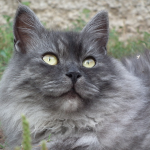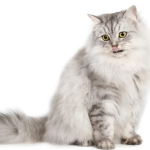Just like humans, cats can grapple with anxiety, impacting their well-being and the bond they share with their owners. Recognizing and managing cat anxiety is crucial for fostering a positive environment and nurturing a healthy relationship between feline companions and their human counterparts.
Understanding Cat Anxiety Triggers Cat anxiety can originate from various sources, explains Marilyn Krieger, a certified cat behavior consultant. Alterations in routine, new environments, unfamiliar animals, or even household disturbances like renovations can trigger stress in cats, making them prone to anxiety-related behaviors.
Mikel Delgado, a certified cat behavior consultant, differentiates anxiety from fear, highlighting that sustained stress is different from momentary fright. Identifying these distinctions aids in addressing the underlying causes and adopting suitable calming solutions.
Managing Cat Anxiety with Effective Products Addressing feline anxiety requires patience and a tailored approach, as what works for one cat might not be effective for another. Over-the-counter calming products can assist but may not yield miraculous results, as Delgado emphasizes.
- Thundershirts for Cats: These compression vests offer gentle, constant pressure akin to swaddling, potentially calming anxious cats. Although not extensively studied for cats, anecdotal evidence suggests reduced agitation in some felines. However, Delgado advises caution when putting them on cats due to potential handling issues.
- Cat Calming Collars: Infused with pheromones mimicking those produced by mother cats, these collars like Sentry HC can soothe cats. Delgado advises gradual introduction to accustom the cat and avoid sudden stress.
- Cat Calming Pheromone Diffusers: Feliway® plug-in diffusers emit synthetic facial pheromones, promoting relaxation. Specifically designed for multi-cat households, these aids in maintaining harmony among cats, favored by Krieger for their stress-reducing benefits.
- Calming Cat Food and Treats: Formulated with tryptophan and alpha-casozepine, these diets and treats, like Royal Canin® Veterinary Diet Calm and Vetriscience® Composure cat chews, aim to manage stress. Delgado notes their potential to induce relaxation in cats under certain circumstances.
- Training and Playtime: Positive interactions through training, play, or clicker training contribute significantly to a cat’s security. Krieger emphasizes the importance of bonding activities, while Delgado suggests trying various toys to find what appeals to individual cats.
- Consulting a Vet: For cats with severe symptoms like over-grooming or aggression, veterinary consultation is crucial. Vets can prescribe anxiety medication and offer strategies for a harmonious home environment.
Recognizing Uncontrolled Anxiety Persistent anxiety signs such as self-injury, aggression, or erratic behavior warrant immediate vet attention. Addressing unmanaged anxiety requires professional intervention and tailored strategies to promote a peaceful and stress-free environment for feline companions.




